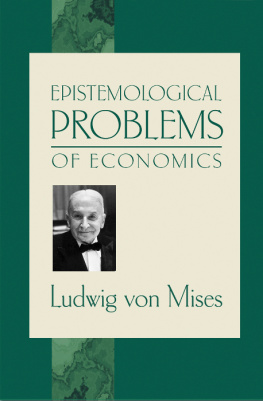von Mises - Epistemological Problems of Economics
Here you can read online von Mises - Epistemological Problems of Economics full text of the book (entire story) in english for free. Download pdf and epub, get meaning, cover and reviews about this ebook. City: Auburn, AL, year: 2003, publisher: Ludwig Von Mises Institute, genre: Romance novel. Description of the work, (preface) as well as reviews are available. Best literature library LitArk.com created for fans of good reading and offers a wide selection of genres:
Romance novel
Science fiction
Adventure
Detective
Science
History
Home and family
Prose
Art
Politics
Computer
Non-fiction
Religion
Business
Children
Humor
Choose a favorite category and find really read worthwhile books. Enjoy immersion in the world of imagination, feel the emotions of the characters or learn something new for yourself, make an fascinating discovery.
- Book:Epistemological Problems of Economics
- Author:
- Publisher:Ludwig Von Mises Institute
- Genre:
- Year:2003
- City:Auburn, AL
- Rating:3 / 5
- Favourites:Add to favourites
- Your mark:
- 60
- 1
- 2
- 3
- 4
- 5
Epistemological Problems of Economics: summary, description and annotation
We offer to read an annotation, description, summary or preface (depends on what the author of the book "Epistemological Problems of Economics" wrote himself). If you haven't found the necessary information about the book — write in the comments, we will try to find it.
von Mises: author's other books
Who wrote Epistemological Problems of Economics? Find out the surname, the name of the author of the book and a list of all author's works by series.
Epistemological Problems of Economics — read online for free the complete book (whole text) full work
Below is the text of the book, divided by pages. System saving the place of the last page read, allows you to conveniently read the book "Epistemological Problems of Economics" online for free, without having to search again every time where you left off. Put a bookmark, and you can go to the page where you finished reading at any time.
Font size:
Interval:
Bookmark:
PROBLEMS
OF ECONOMICS
Translated by George Reisman
Introduction to the Third Edition by Jrg Guido Hlsmann

Grundprobleme der Nationalkonomie: Untersuchungen ber Verfahren, Aufgaben und Inhalt der Wirtschafts- und Gesellschaftslehre (1933)
Epistemological Problems of Economics
Translated from the German by George Reisman
Published simultaneously in the United States and Canada by D. Van Nostrand Co., 1960
Reprinted 1978 by New York University Press, with Foreword by Ludwig M. Lachmann Copyright 1976 Institute for Humane Studies
Third edition 2003 by Ludwig von Mises Institute
Copyright Bettina Bien Greaves
ISBN: 0-945466-36-6
Ludwig von Mises (18811973) is arguably the most important economist of the twentieth century, and one of the greatest social philosophers ever. He made a large number of lasting contributions to economic theory, yet his main achievement is in the elaboration of a comprehensive system of social analysis. Mises had started his career as a student of economic and social history and then became a top policy analyst and government advisor in his native Austria. He continued to pursue scientific research in his spare time, though, and increasingly turned to deal with problems of economic theory. When he became a full-time professor at the age of 53, he finally had the opportunity to put his various works together. At the end of his life, he had developed a general science of human action that today inspires a thriving school of followers.
The present book features the first outline of this general science of human action and, in particular, of Mises's views on the logical and epistemological features of social interpretation. Unique among his works and a milestone in the history of science, it contains those essays in which Mises refuted the theories of the thinkers to whom he felt the closest intellectual affinity, in particular, Carl Menger, Eugen von Bhm-Bawerk, and Max Weber. Mises here cleared the ground for later works, in which he further developed his theoretical system. It might therefore be especially interesting and useful for readers with a background in sociology or philosophy looking for a suitable initiation to Mises's thought.
Epistemological Problems of Economics was first published in German in 1933 and eventually appeared in an English translation in 1960. Most of its chapters had been published as journal articles between 1928 and 1931. In 1933, Mises added chapters one and seven and published the whole collection. The book focuses on two problems:
First, Mises argues that the Austrian theory of value, which had been developed by Carl Menger and his followers, is the core element of a general theory of human behavior that transcends the traditional confines of economic science. Value theory applies to human action at all times and places, whereas economic theory only applies to a special subset of human action, namely, to human action guided by economic calculation. In Epistemological Problems of Economics, Mises not only explains these fundamental distinctions and stresses that economics is just one part of a general theory of human action. He also ventures into the elaboration of this general theory, in particular, through the analysis of its central componentvalue theory. Mises contributes a thorough critique of the value theories of Carl Menger and Eugen von Bhm-Bawerk, and in several chapters of the book carefully refines and restates value theory.
Second, Mises argues that the general social science of which economics is the best-developed part has a rather unique logical and epistemological nature. In distinct contrast to the natural sciences it is not based on observation or any other information gathered through the human senses. It relies on insights about certain structural features of human action, such as the fact that human beings make choices or that they use self-chosen means to attain self-chosen ends. The validity of economic theory does therefore not stand and fall with empirical investigations. Rather, economic laws are a priori laws that cannot be confirmed or refuted by the methods predominant in the natural sciences. They exist independent of the particular conditions of time and place, and the social scientist comes to know them through pure deductive reasoning.
reason enough to republish the book without any alterations except for the correction of orthographic errors.
Mises is probably best known to the broader public as the author of Human Action, the treatise in which he deals with the natural laws of human action. He pointed out that the science dealing with the laws of human action was first developed in a relatively narrow field, namely, in the field of human action guided by economic calculation based on money prices. The name of the new science was political economy and later economics. Whereas the writers of all previous ages had approached social reality from a normative point of viewasking how things should bethe economists had pioneered the causal explanation of social reality as it was, leaving aside the question how it should be. The economists were the first true social scientists because they knew how to deal with social affairs as matters of fact, just as the natural scientists studying the facts of nature.
In the second half of the nineteenth century, then, economic science began to be transformed into a general science of human action. The decisive event in this process was a breakthrough in the development of value theory. The classical economistsin particular the British labor-value school of Smith and Ricardohad acknowledged that and the price of any given thing somehow depended on its utility; but they had been unable to determine the precise nature of this dependency and therefore insisted on labor-value as the proximate cause of market prices. Things changed radically with the development of price theories built on the principle of marginal utility. In the 1870s, a breakthrough came for these new theories when Carl Menger, Lon Walras, and William Stanley Jevons, working independently from one another, developed theories that traced back market prices to the relative utility of particular units of goods.
The discovery that economic goods were evaluated at the margin, rather than in one blob, went hand-in-hand with the discovery of another important principle, namely, the principle of subjectivism. Evaluation at the margin meant in fact nothing else but that there was some individual who did the evaluation. In other words, the marginal utility of an economic good depended essentially on the individual person for whom the marginal unit under consideration was useful.
Finally, the new theoreticians also discovered that the utility of the marginal unit depended on the available supply of the good in question, such that the marginal utility of a unit of a larger supply is smaller than the marginal utility of a unit of a smaller supply. This was the law of diminishing marginal utility.
The immediate significance of these discoveries was that market prices could now be explained in a more consistent way than on the basis of the British labor-value theory. But there were two more far-reaching implications that at first escaped the attention of the pioneers of the new approach.
First, the old theory had not actually been a positive theory of observed market prices, but a theory of equilibrium prices. It was not so much an explanation of things that observably existed, but of things that
Font size:
Interval:
Bookmark:
Similar books «Epistemological Problems of Economics»
Look at similar books to Epistemological Problems of Economics. We have selected literature similar in name and meaning in the hope of providing readers with more options to find new, interesting, not yet read works.
Discussion, reviews of the book Epistemological Problems of Economics and just readers' own opinions. Leave your comments, write what you think about the work, its meaning or the main characters. Specify what exactly you liked and what you didn't like, and why you think so.









